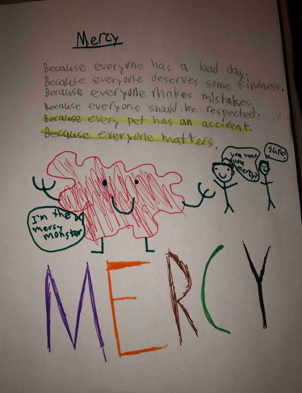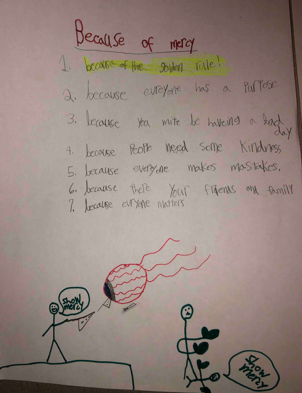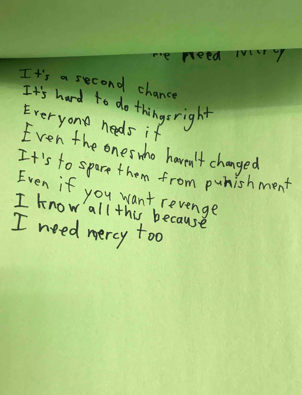Just Mercy: A Vehicle for Teaching Social Justice
The late Rahima Wade once argued that, “Teaching for social justice begins with the idea that every human being is entitled to decent standards of freedom and justice, and that every violation must be acknowledged, testified to, and opposed.” There is an ever-increasing need for these civic values in our democratic society, particularly in a nation with many differing social, cultural, economic, and political backgrounds, and where historically some citizens have been privileged at the expense of others. We approach our teaching through this lens and believe that teachers have a profound responsibility in preparing children to be socially-just individuals.
The idea for this project grew from our excitement of the “One Book Initiative” that made its debut at UNA this fall semester, an offshoot of a national program that seeks to promote literacy and a sense of community by having everyone read the same book (see the Times Daily article for more information), and through our commitment to teaching the issues of social justice so prevalent in Bryan Stevenson’s book and the greater society in which we all live. The adapted young adult version of Just Mercy was the perfect vehicle for bringing such issues to light with UNA elementary education majors and Kilby Laboratory 4th grade students.
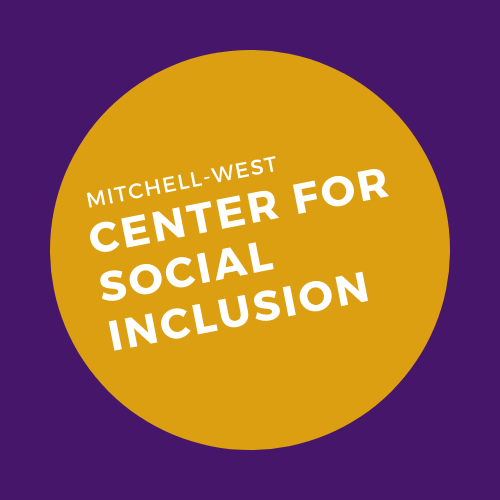
- Written By:
- Dr. Erin Piedmont (Elementary Education)
- Ms. Argie Campbell (Kilby Laboratory School)
- Sponsored by:
- Mitchell-West Center for Social Inclusion
Preparing Future Teachers for Social Justice Education
To prepare future teachers for social justice education it is essential that they discuss challenging concepts such as power, privilege, and oppression, and that they examine how often-valued institutions in society, like the criminal justice system, contribute to maintaining the unjust experiences of many of our citizens. To do this, we challenged our UNA teachers to engage in such critical discussions using Just Mercy with the goal of designing learning experiences developmentally appropriate for 4th grade students.
Over the course of the semester, our UNA teachers participated in a book club using the young adult version of Just Mercy during which they grappled with essential questions such as, “What does it mean to be merciful?” “Who is in need of mercy?” and “How can we apply mercy to systems and institutions in our society in order to make them more just?” Additionally, they explored poetry as a powerful and liberating avenue for expressing their thoughts in response to the content. These experiences prepared our UNA teachers to participate in similar learning with the 4th grade students at Kilby.
Theory to Practice
Ms. Argie Campbell’s 4th grade class at Kilby Laboratory School has a “Social Justice” block every other week, providing a chance to make explicit connections between content-area curriculum and social justice ideas. Additionally, the activities designed for these lessons serve as character and community-building opportunities, as Ms. Campbell chose to schedule Social Justice to supplement the Guidance block that meets at the same time on alternating weeks. While the curricular framework for Social Justice follows the scope and sequence for 4th grade social studies, the Alabama Course of Study standards addressed in each lesson are also literacy-based. In addition, every lesson is aligned to at least one of the Social Justice Standards, developed by Teaching Tolerance as a grade-banded, developmentally appropriate anti-bias framework. This classroom setting provided an ideal space in which Dr. Erin Piedmont could conduct her course clinical experiences.
Dr. Piedmont’s class visited Kilby’s 4th grade classroom every two weeks for the Social Justice block, first to observe Ms. Campbell’s close reading and then to engage 4th graders in writing workshop. Dr. Piedmont and Ms. Campbell collaborated to identify powerful excerpts from Bryan Stevenson’s Just Mercy and adapt them for upper elementary students. The first lesson focused on the concept of privilege, which immediately reminded 4th graders of the stratified pioneer society they had been studying in social studies. Subsequent lessons delved deeper into the power of privilege while tying in the concept of mercy. The 4th graders grappled with the following essential questions throughout their learning: “Which is more powerful, privilege or mercy?” and “Is it better to give mercy or receive mercy?”
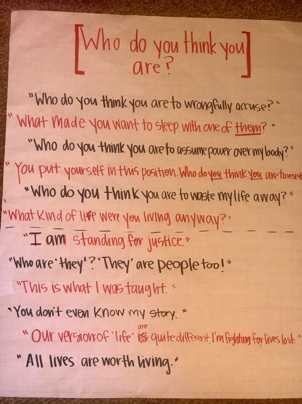
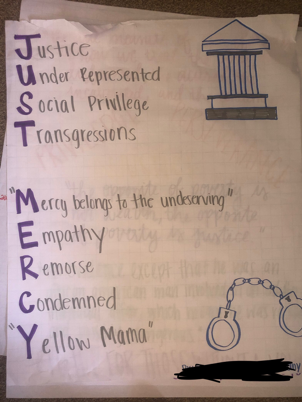
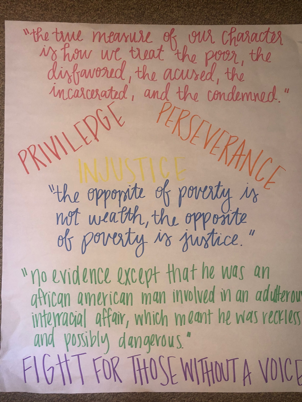
Poetry composed by UNA elementary education majors.
The UNA teachers built on Ms. Campbells’s close reading discussions by designing poetry units that engaged the 4th graders in a deeper understanding of the concept of mercy. They drew from the Just Mercy excerpts discussed during each Social Justice lesson and encouraged the students to make connections to social studies content they had previously learned in Ms. Campbell’s class, such as chattel slavery and the Indian Removal Act of 1830. In addition, the 4th graders shared everyday experiences in which they extended or experienced mercy with others. For the culminating project, the UNA teachers guided the 4th graders as they composed poems related to their learning. To conclude, they shared the final drafts of their poetry via an “Author’s Chair” session, which the UNA teachers used as an opportunity to reinforce the idea that writing can serve as a powerful tool for making the world a better place.
